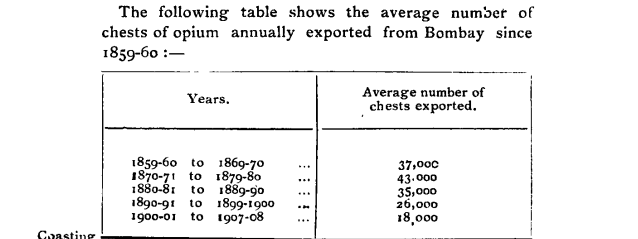Bombay Opium Trade and Traders
By the beginning of the 19th century two commodities gained prime significance in the trade circuit of England and Asia, raw cotton and opium. Opium in particular was being exported from India(Daman) earlier and later from Bombay to China(Canton). The opium trade was part of the triangular trade that happened between India-China and England. Indian products, Opium and Cotton were exported to China, where the payment was made in Silver. Goods from China-tea, silk, silver and Bills of Exchange were exported to England. Proceeds from sale of these products were used to pay for the Indian opium. Ships would ply between Bombay and Canton filled with Cotton from Gujarat and Opium from Malwa. This way the British balanced the trade with China by paying for their tea with cotton and opium. More or less the London Canton trade was the monopoly of the EIC, while Bombay Canton trade was under private traders. After 1729, EIC stopped carrying the opium in its own ships but rather ships of private individulas from India were used for the same. Pestonji Bomaji Wadia had four vessels of his own engaged in the trade of opium. The Sassoons by 1870s became major Indian players in trade of opium. In in 1831, the EIC allowed Malwa opium to be shipped through Bombay on payment of a transit duty.

Source: Gazetteer, 1909
According to Rajnarayan Chandavarkar, from 1820s onwards export of opium along with raw cotton became the centre of Bombay's commercial growth and of its residents who were engaged in this.
First Opium War 1839
1842 Treaty of Nanking was signed
Opium Clippers were specially designed ships for transporting opium, they were fast and well-armed.
On 22nd March, 1887 representatives of David Sassoon, Tatas, Wadias and others wrote a petition to the Legislative Council of Hong Kong requesting them to withhold a Bill that was aimed at preventing smuggling of opium into China saying that would have serious affects on the traders of opium trade and thus impact the commerce of the Colony.
In 1913 the export of Malwa opium was stopped by Government of India after the break of Chinese revolution.
